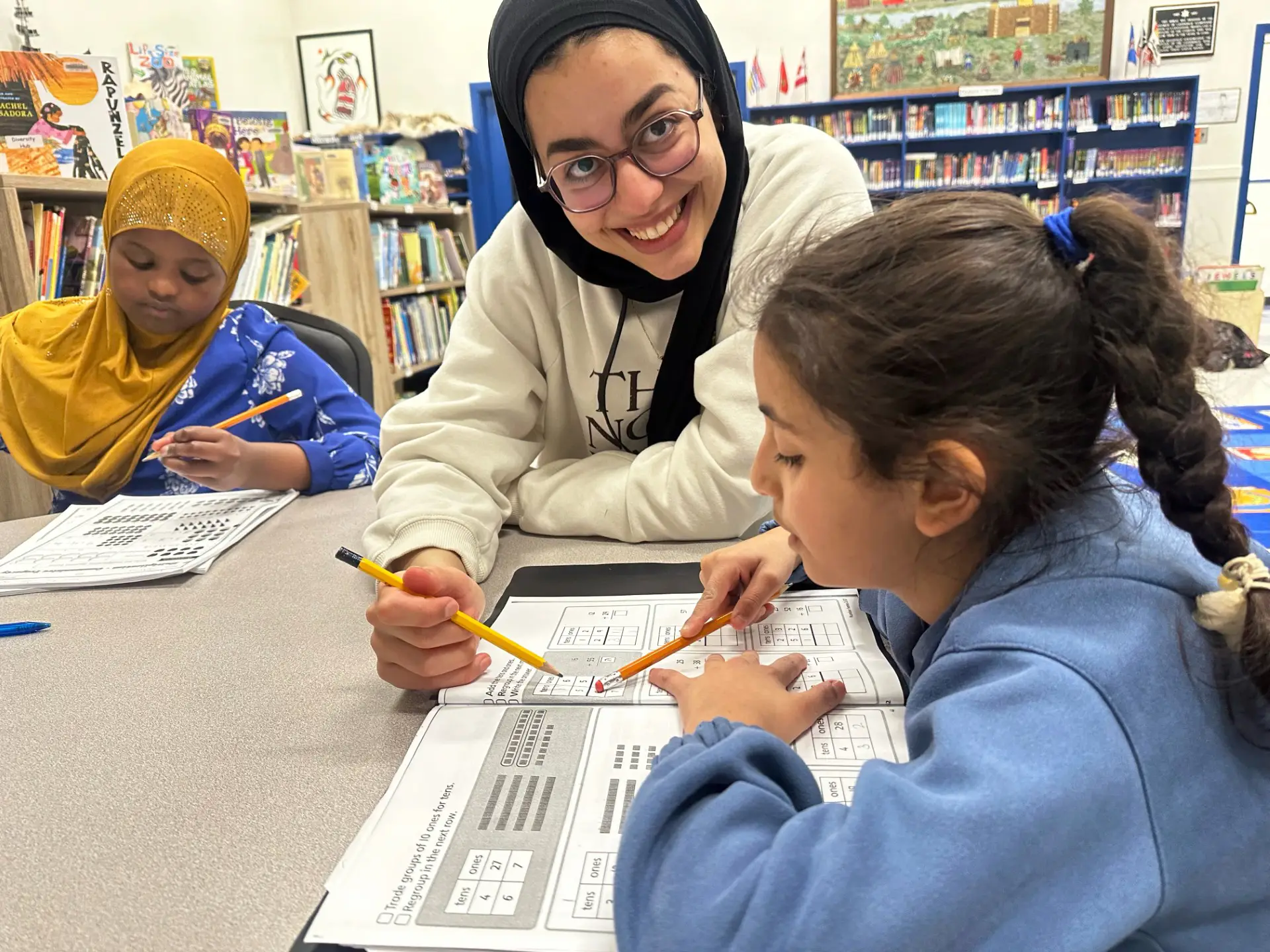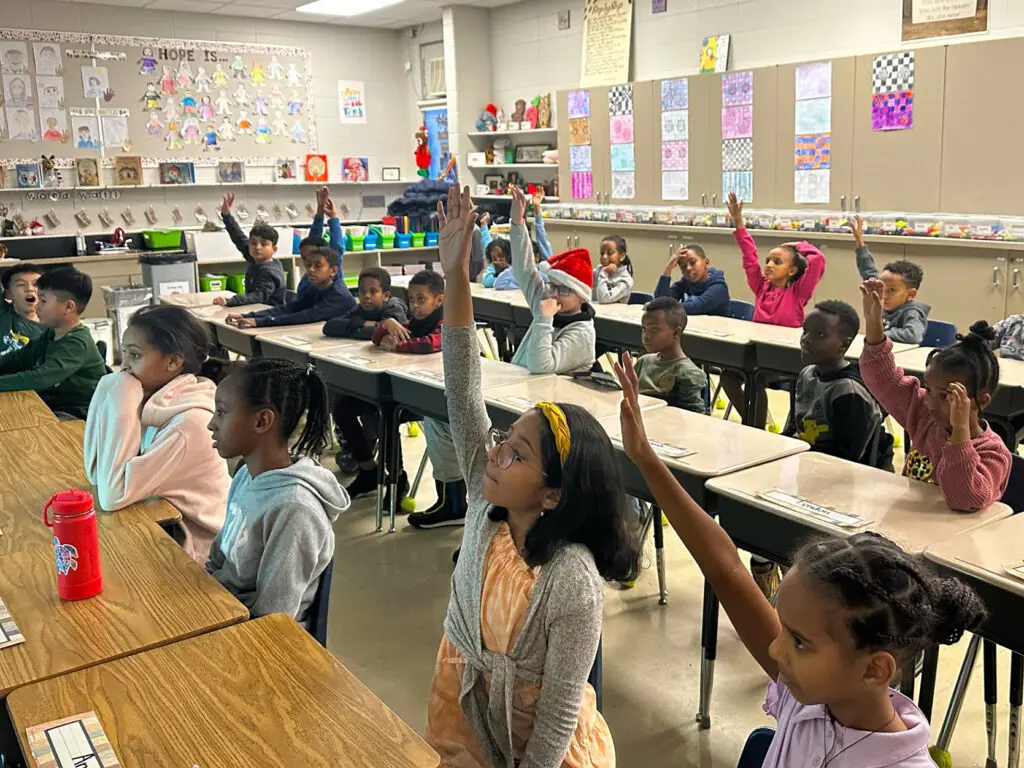September 12, 2025

Last year, the Alberta Immigrant Women and Children’s Centre’s (AIWCC) After School Program for new refugees lost a major funder. But United Way’s recent shift in funding not only filled that gap, but supported AIWCC to expand.
United Way’s innovative Front-Line Agency Funding approach allows agency partners to use funding as needed, instead of having to designate it to a specific program. This meant AIWCC could use the funding to increase the number of schools they serve from just five to 15 partner schools across Edmonton. It enabled them to hire and train more youth facilitators as well as enhance the quality and variety of programming, including academic support, arts and crafts, sports, mental health workshops, and leadership development. In addition, the After School Program is now able to provide snacks, which has boosted regular attendance.
Shukri Othman, Youth Program Coordinator at AIWCC says, “United Way’s support helped reach more children, deepen our community impact, and strengthen relationships with school partners.”
Last year, over 400 children across fifteen Edmonton elementary schools attended the school-based program. For two hours once a week, thirty students at each school experience fun physical activity, language learning, and homework help. Not only that, they can connect with supportive mentors who share their newcomer experiences.
“Many of our youth facilitators are immigrants themselves. Some of them even came through our programs in elementary and now they’re in university,” says Shukri. “The children really get to meet role models.”
Shukri speaks from experience. Ten years ago she was a participant in AIWCC’s youth program. Since completing a social work degree, she has coordinated the After Schools Program. “It’s been incredibly meaningful to grow within the organization and continue giving back to a program that helped shape me.”

As a youth facilitator for the past five years, Aryam Estifanos has seen the program’s impact. “You see the kids first not able to speak any English, until eventually they’re able to be vocal about how they feel.”
Supporting language learning is a key part of the program. On any given program day, a half-dozen different languages may be spoken by program staff. If staff don’t speak the student’s language, then there are over thirty different languages spoken by staff of the AIWCC to assist students and their families if they have translation or advocacy needs.
“We can support students one-on-one if they’re having an issue at the school,” says Shukri. “Our staff are great advocates, and we can go to the principal, or whoever they need to go to, and help address the student’s concern.”
Hanad Abdulle is a youth facilitator who also started with AIWCC as a participant. He likes working with kids that can be a little more challenging. “Because when they grow, it’s a drastic growth, right?” Sometimes it’s the small moments that draw them out. Then, “their whole demeanor changes when they start joining activities or being more communicative.”
While the youth facilitators help with practical challenges, their impact often lies in their own story.
“It grows their self-confidence to see us as newcomers—who were like them at the beginning—now able to give back to the community,” Aryam says.
“It’s like we help them see their future. I tell them, ‘Don't worry! This struggle is just temporary. You will overcome it.”
Aryam Estifanos
AIWCC youth facilitator
It’s not just students who feel hope when they meet AIWCC’s kind and confident team.
“We have an amazing relationship with parents,” says Shukri. “When they pick up their kids, they like to see the youth facilitators and ask all kinds of questions: ‘When did you come to Canada? How is my kid’s experience going to be when they get older? Are they going to be able to go to university?’”
The parents often open up about their own anxieties. Worries about their children’s transition to life in Canada, their own language barriers, and job searches are significant shared concerns.
“I feel like their anxieties revolve around how it’s so new to them,” reflects Nour AbdelHakim, a university student who first started working with AIWCC as a volunteer. “When you move to a new place, you don’t know what to expect. So when they see me doing well here, they think oh, you know what? Maybe my child can settle in and adapt and not lose what they had coming to Canada.”
Youth facilitators listen carefully for how the agency can be supportive to the whole family. Because of the program’s connection with the larger agency, they often refer families to other supports to help ease their transition.
“Our goal is always to connect them to our many resources. Whether it’s for food, English as an Additional Language learning, or case management paperwork that’s stressing them out,” says Aryam. “Sometimes they need to find a job or want to go back to school so they’re better able to support their kids.”
The program’s success has also been supported by AIWCC’s strong partnerships within every school they work in.
“We work with such amazing school administration teams,” says Shukri. “Together we make sure the kids are supported emotionally, socially, and academically.”
Because the program can be oversubscribed in some schools, facilitators work closely with administration to identify the students with the greatest needs.
“When I first came to Canada, we didn’t have this kind of programming,” Aryam says. “I really hope this grows to more schools.”

When you support United Way, you remove the barriers that hold students back — whether it’s lack of mentorship, struggling with mental health, or families navigating the system alone. Your support means more kids get the guidance, confidence, and connections they need to stay in school and build better lives.
Eliminating Barriers to Educational Success